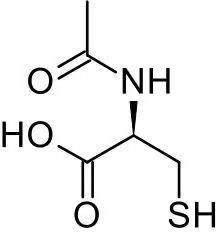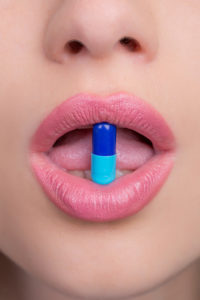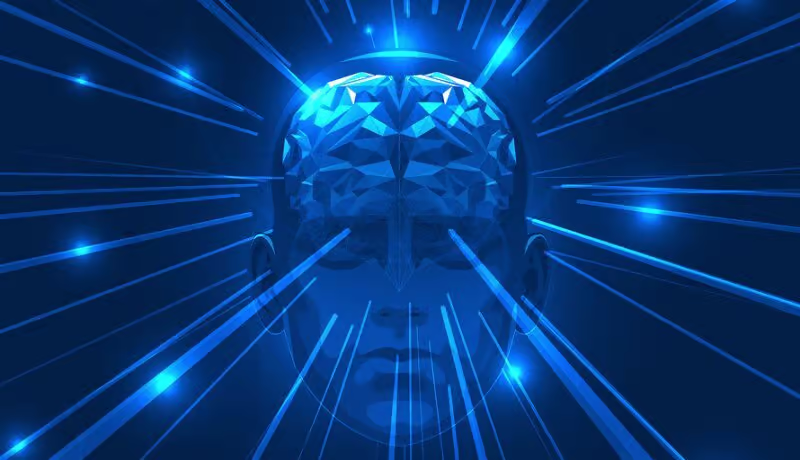Table of Contents
Key Takeaways
- N-Acetyl L-Cysteine (NAC) is a powerful antioxidant that restores glutathione levels in the body and brain, helping maintain oxidative balance in cells.
- NAC has neuroprotective properties, reducing inflammation, oxidative damage, and modulating glutamate levels and dopamine release, positively impacting cognition, memory, and mood.
- NAC shows potential in treating serious cognitive disorders like schizophrenia, bipolar disorder, severe depression, and anxiety by boosting glutathione and dopamine levels in the brain.
- NAC can reduce oxidative stress, eliminate free radicals, rejuvenate dopamine receptors, and enhance cognitive function when taken as a supplement.
- N-Acetyl L-Cysteine (NAC) dosage recommendation is 500 mg, 3-times per day
N-Acetyl L-Cysteine (NAC or N-acetylcysteine) is the N-acetyl derivative of the naturally occurring amino acid L-cysteine. And works primarily by helping restore the body’s natural antioxidant glutathione (γ-glutamylcysteinylglycine; GSH).
As the most abundant antioxidant in your body, GSH is responsible for maintaining oxidative balance in each of your cells.
I have been using 500 mg NAC 3-times per day and every day for the last decade and it is one of my favorite supplements.
Taking glutathione as a nootropic supplement does not adequately restore GSH levels in your brain because it can’t cross the blood-brain barrier. This vastly underrated nootropic, NAC easily penetrates the blood-brain barrier and raises glutathione levels in your brain.[i]
NAC has been used to treat acetaminophen poisoning for decades.[ii] Every year there are 56,000 ER visits from Tylenol overdose, resulting in at least 100 deaths. [iii] NAC provides the glutathione your liver needs to fight off the metabolite NAPQI in Tylenol that does severe liver damage.
Studies show that as a nootropic, NAC helps prevent glutamate toxicity, boosts dopamine, and reduces inflammation, oxidative and free radical damage.
Where to buy: one of the only vendors still selling NAC and I highly recommend them: Life Extension – NAC
N-Acetyl L-Cysteine helps:
- Neuroprotection. NAC as a precursor of glutathione, is a potent antioxidant, anti-inflammatory and free radical scavenger.[iv] Your brain is especially vulnerable to inflammation, free radical and oxidative damage. Affecting cognition, long-term potentiation, memory and mood.
- Neurotransmitters. NAC modulates glutamate levels and dopamine release in the brain. Excess glutamate in your brain is toxic to brain cells affecting neuron health, cognition, memory and mood. And NAC protects dopamine receptors. Influencing dopamine levels and function in your brain. Even protecting dopaminergic nerve terminals from chronic methamphetamine use.[v]
- Anxiety and depression. NAC reduces irritability, anxiety and depression. NAC increases your body’s antioxidant capacity, and balances excitatory and inhibitory neurotransmitters in your brain. Resulting in less anxiety and depression.
N-Acetyl L-Cysteine (NAC)
N-Acetyl L-Cysteine (NAC) is the N-acetyl form of the naturally occurring amino acid L-Cysteine.

L-Cysteine is naturally produced in your body using the amino acid methionine. You can also get L-Cysteine from eating ricotta and cottage cheese, yogurt, pork, chicken, turkey, duck, wheat germ, granola and oat flakes.
But acute stress, illness, or a poor diet can deplete L-Cysteine levels in your body and brain. The quickest and most efficient way to boost levels of L-Cysteine is to supplement with N-Acetyl L-Cysteine (NAC).
NAC regulates the amount of glutamate in your brain. Glutamate is a neurotransmitter that is responsible for sending signals between neurons in the brain. This plays an important role in learning and forming memories.
But too much glutamate can be toxic to brain cells. NAC regulates the amount of glutamate and keeps it at safe, healthy levels.
NAC influences the amount of dopamine available in your brain. It works to keep dopamine receptors healthy and able to transmit and receive dopamine. These neurotransmitters are crucial for cognitive energy and drive, motor control, feelings of pleasure, and focus.
NAC is a precursor to the powerful anti-oxidant glutathione (GSH). GSH is a potent anti-inflammatory, anti-oxidant and free radical scavenger.
Your brain is especially vulnerable to inflammation, free radical and oxidative damage. If left unchecked, inflammation, oxidation and free radicals can negatively affect cognition, long-term potentiation, memory and mood.
As a nootropic, NAC can boost glutathione and dopamine levels in your brain. NAC is also used by medical professionals to treat serious cognitive disorders like schizophrenia, bipolar disorder, severe depression and anxiety.
How does N-Acetyl L-Cysteine work in the Brain?
N-Acetyl L-Cysteine boosts brain health and function in several ways. But two in particular stand out.
- N-Acetyl L-Cysteine reduces oxidative stress. Oxidative stress is caused by free radical damage in brain immune cells. Leading to neurodegeneration and reducing brain health which can lead to Alzheimer’s, Parkinson’s and other age-related neuronal disorders. Proteins and DNA are injured, inflammation, tissue damage and cellular apoptosis (cell death) are the result.
And neurohackers are not immune to oxidative stress no matter what your age. Keep this in mind the next time you reach for a Diet Coke. Consumption of the artificial sweetener aspartame induces cortical inflammation and oxidative stress. And negatively affecting brain health.
Researchers did a study with 30 adult male Wistar rats randomly divided into 3 groups. The control group received distilled water. The second group was given aspartame. And the third group was given aspartame and NAC. Oral administration was done in the morning daily for 90 days.
The study found that NAC boosted Brain-Derived Neurotrophic Factor (BDNF) levels, blocked the COX-2 and PGE2 inflammatory enzymes, and reduced the expression of interleukin-6 (IL-6) and tumor necrosis factor-α (TNF-α) inflammatory cytokines in the rat cerebral cortex. They also found that NAC replenished glutathione levels.
The researchers concluded that NAC prevented neurotoxicity and improved neurological function, suppressed brain inflammation, and oxidative stress response.[vi]
- NAC relieves depression. Major depressive disorder is one of the most common psychiatric disorders. It’s a burden on the individual, family and the community. And the pharmaceutical companies are making literally billions on selling various anti-depressants. Not treating the cause, producing a host of side effects, and in most cases just ‘dumbing down’ the symptoms.
But the pipeline for new anti-depressant drug discovery is at a near stand-still for treating problems like schizophrenia, bipolar disorder, depression and common forms of autism.
The good news is that neuroscience continues to work on the problem. And have shown that many of these disorders share immune health issues such as inflammation and oxidative stress as part of their disease physiology.
Neuroscientists also discovered that associated pathways causing these diseases include a reduction in proteins that stimulate neuron growth (neurotrophins), increased apoptosis (cell death), and reduced energy generation in mitochondria.
It turns out that N-Acetyl Cysteine seems to have multiple effects on all these pathways. NAC reduces the core symptoms of schizophrenia, reduces depression, and reduces cravings for a number of addictions including cocaine, cannabis and tobacco.[vii]
How things go bad
As we get older or suffer from chronic illness, our brain and body chemistry and energy metabolism changes.
↑ Oxidative stress in brain cells increase
↓ Free radicals damage neurons
↓ Dopamine receptors stop working
↑ Glutamate toxicity causes cell damage and apoptosis
↓ Brain-Derived Neurotrophic Factor (BDNF) declines
↓ Mitochondria energy declines
All of these changes are often attributed to chronic illness, lifestyle choices, and aging.
Unchecked, they could lead to neurodegenerative diseases like Parkinson’s, Alzheimer’s, major depression, schizophrenia, OCD, addictions, autism, and a drop in quality of life.
N-Acetyl L-Cysteine health benefits
N-Acetyl L-Cysteine (NAC) is a slightly modified version of the sulfur-containing amino acid L-Cysteine. When taken as a supplement, NAC can reduce oxidative stress by replenishing intracellular levels of the natural antioxidant glutathione (GSH). Restoring your cells’ ability to fight damage from reactive oxygen species (ROS).
Conventional medicine has used NAC for decades as an inhaled mucous thinner to treat symptoms of cystic fibrosis. Patients receive intravenous NAC (IV) or orally as a treatment for acute acetaminophen overdose poisoning. NAC quickly restores glutathione levels, averting permanent disability or death.
The nootropics community has recently discovered NAC as a way to suppress inflammation in the brain. NAC prevents oxidative stress on brain cells, eliminates free radicals, restores Brain-Derived Neurotrophic Factor (BDNF), rejuvenates dopamine receptors, and improves overall cognitive function.
NAC can help boost cognition, Long-Term Potentiation for long-term memory formation, short-term and working memory, improve your mood and quell anxiety.
How does N-Acetyl L-Cysteine feel?
Neurohackers report that supplementing with NAC could be the best nootropic they’ve ever used for their brain and overall health. Comments include:
- Thinking is clearer (less brain fog)

- Memory improves
- Concentration and attention improves
- Less anxiety
- Less depression
- Less irritable
- Mood improves (like a ‘clean high’)
- Symptoms caused by ADHD meds disappear
- Obsessive Compulsive behavior decreases
- Sleep quality improves
- Energy levels increase
- Weight maintenance is easier
- Less flu and colds
- Skin looks better
- Feel younger
- Hangovers are less severe
N-Acetyl L-Cysteine Clinical Research
N-Acetyl L-Cysteine increases dopamine in Parkinson’s Disease
Treatments for Parkinson’s Disease are limited to replacing dopamine in the brain. As well as some medications designed to slow down the disease.
In 2016, researchers at Thomas Jefferson University showed that oxidative stress in the brain could play a critical role in the progression of Parkinson’s. And this stress lowers levels of glutathione, a compound produced in the brain to counteract oxidative stress.
Studies show that N-Acetyl L-Cysteine (NAC) helps reduce oxidative damage to neurons by helping restore the levels of the antioxidant glutathione.
In this study, Parkinson’s patients were placed into two groups. The first group received 50 mg/kg of an intravenous n acetyl cysteine (IV) once per week. And 600 mg of NAC as a supplement twice a day on non-IV days.
The second (control) group received only their standard Parkinson’s treatment. Patients were evaluated at the beginning of the study and again 3 months later.
The evaluation consisted of the Unified Parkinson’s Disease Rating Scale (UPDRS), and a SPECT brain scan which measures the amount of dopamine transporter in the brain.
Compared to controls, the patients receiving NAC had significant improvements in their scores. One of the study authors said, “We have not previously seen an intervention for Parkinson’s disease have this kind of effect on the brain”. This study demonstrated for the first time the direct effect of NAC on the brain’s dopamine system. NAC has the unique ability to enable dopamine neurons to recover their function.[viii]
N Acetyl Cysteine (NAC) alleviates symptoms related to Chronic Obstructive Lung Disease
People suffering from chronic obstructive pulmonary disease (COPD) may experience long-term oxidative damage and inflammation of lung tissue. And lack of oxygen to the brain can have a severe impact on memory.
In addition, any chronic lung disease, such as bronchitis, can cause airways to constrict. This inflammation may lead to shortness of breath or coughing. Research suggests that taking the potent antioxidant N-Acetyl Cysteine (NAC), dietary supplements can help improve symptoms related to COPD, chronic bronchitis, and its complications, and improve lung function.
N-Acetyl L-Cysteine repairs Traumatic Brain Injury
Traumatic brain injury (TBI) is a major public health issue affecting 69 million people worldwide each year.[ix] TBI can be caused by sports injuries, work accidents, car and motorcycle accidents, falls, and your wife hitting you over the head with a frying pan.
Many survivors end up with long-term or even permanent neurocognitive dysfunction. Affecting cognition, motor function (movement) and personality. These disabilities are estimated to cost $26 billion in lifetime medical costs and $631 billion in quality of life lost.[x]
A major cause of TBI comes from blast exposure on the battlefield. Symptoms are similar to other causes of TBI; dizziness, hearing loss, headache, memory loss, sleep issues, and neurocognitive dysfunction.
In a brain subjected to TBI there is glutamate toxicity, free-radical injury to brain cells, electrolyte imbalances, mitochondrial dysfunction, inflammation, apoptosis (cell death) and stroke.[xi][xii]
This double blind, placebo-controlled study was conducted with 81 active duty service members at a forward deployed field hospital in Iraq. All service members in this study were exposed to significant ordinance blast and met the criteria for TBI.
Service members were randomly assigned to receive either a placebo or N-Acetyl L-Cysteine (NAC) for 7 days. The resolution after 7 days of all the TBI symptoms listed above was the main outcome measure of this study.
The researchers concluded that NAC was a safe pharmaceutical countermeasure of blast-induced TBI. And that further work on long term outcomes and the potential use of NAC in civilian TBI is warranted.[xiii]
N-Acetyl L-Cysteine helps alleviate depression
Both depression and bipolar disorder are complicated by glutathione depletion. The researchers in this double-blind, multicenter, placebo-controlled study worked with 75 subjects with bipolar disorder.
Subjects received 1 gram of NAC twice daily for 24 weeks. NAC treatment caused a significant improvement with depression with those using NAC.
The researchers concluded, “NAC appears a safe and effective augmentation strategy for depressive symptoms”. In this case with people suffering from bipolar disorder.[xiv]
N-Acetyl L-Cysteine Recommended Dosage
 N-Acetyl L-Cysteine (NAC) suggested dosage for cognitive benefit is 500 mg 3-times per day.
N-Acetyl L-Cysteine (NAC) suggested dosage for cognitive benefit is 500 mg 3-times per day.
Clinical studies have found that doses up to 2,000 mg per day are safe and effective.
And one German study showed the safety of 2,800 mg per day for 3 months in patients with cystic fibrosis.[xv]
NAC has also proven effective against seasonal influenza and flu-like illnesses. One large study of older adults in Italy took 600 mg of NAC twice daily for 6 months. Only 25% of those adults who used NAC experienced flu-like episodes compared to 79% in the placebo group.[xvi]
N-Acetyl L-Cysteine Side Effects
N-Acetyl L-Cysteine (NAC) is the N-acetyl form of one of the naturally occurring amino acids of the body, L-Cysteine.
NAC is a slightly modified version of the sulfur-containing amino acid L-Cysteine. So NAC in powder form can have an unpleasant smell.
Very rarely can NAC cause nausea, vomiting, diarrhea or constipation. Even more rare are rashes, fever, headache, drowsiness, low blood pressure and liver problems.
Side effects can be a result of very high doses of NAC. And if you have a genetic condition called Cystinuria do not use NAC. This rare condition causes stones to form in the kidneys, ureter and bladder from cysteine. NAC is the N-Acetyl form of Cysteine.
One study has also found that long-term use of high-dose NAC can deplete your body’s stores of zinc. So if you are using NAC everyday you should also supplement with zinc and low dose copper.
Where to buy N-Acetyl L-Cysteine
N-Acetyl L-Cysteine (NAC) is available in powder, tablet and capsule form. NAC capsules and tablets were usually 500 mg.
Where to buy: I highly recommend: Life Extension – NAC
NAC was in short supply because on July 23, 2020, the FDA sent a warning letter to Purple Biosciences LLC about its NAC product. And asserted that NAC was illegally sold as a dietary supplement because it was approved as a drug September 14, 1963. Several other letters were sent to supplement manufacturers. Resulting in NAC being difficult to find on Amazon or many of the other sites that used to sell NAC.
Several lawsuits were filed against the FDA. And NAC has since become easier to find in the supplements sections of online stores.
Nootropics Expert Recommendation
N-Acetyl L-Cysteine (NAC) 500 mg, 3-times per day
 I highly recommend using N-Acetyl L-Cysteine (NAC) as a nootropic supplement.
I highly recommend using N-Acetyl L-Cysteine (NAC) as a nootropic supplement.
Your body does synthesize some L-Cysteine from methionine. And you can get L-Cysteine from foods such as dairy, poultry, pork, and some grains and nuts.
But most of us don’t get enough N-Acetyl L-Cysteine from our diet. So supplementation will help. And N-Acetyl L-Cysteine is a highly bioavailable form of L-Cysteine. So you should feel its effects faster.
NAC is helpful for most neurohackers to improve mood, memory, cognition, and concentration. And NAC helps alleviate brain fog, anxiety, and irritability.
NAC is especially helpful to those dealing with Obsessive Compulsive Disorder. And stacked with ADHD meds, NAC helps alleviate some of the negative side effects associated with stimulants.
If you can still find it, you can safely use up to 1,800 mg of NAC per day. The usual dose for cognitive improvement is 500 mg dosed 3 times throughout your day.
I recommend N-Acetyl L-Cysteine (NAC) from : Life Extension – NAC








Join The Discussion - 556 comments
jan
June 28, 2021
Hi, I have ocd and are coming off antidepressants
i recently ordered 5htp and would like to try N-Acetyl-L-Cysteine. Also i have heard that inositol can help with ocd. can u take all of these supplements together? which would be the best brand of N-Acetyl-L-Cysteine? i found you on youtube and i saw that u help a lot of people answer questions. i also am currently suffering from depression and anxiety due to my ocd. any thing u can recommend? thank you!!!!
David Tomen
June 29, 2021
Jan, there is a link to HR Supplements in the last section of the article above. Look in the section called “Where to buy N-Acetyl L-Cysteine”.
5-HTP is not going to help OCD and not a supplement I recommend. Inositol has been shown in clinical trials to be effective for OCD.
I suggest doing a search of Nootropics Expert using the search function top right of the top menu and search for “OCD”. You’ll get a list of at least a dozen supplements to try.
Sherylin
June 26, 2021
Hi David
I have been told that taking 1 gram of C with the NAC helps to make it safe from getting stones. So gram for gram.
Thought I would pass this on to you for others as well. 🙂
Thank you for all that you do for us. 🙂
David Tomen
June 27, 2021
Sherylin, thanks for the tip. NAC does NOT cause kidney stones but a gram of Vitamin C is good for everybody.
Jesse
June 9, 2021
I find NAC very good taking it before bed but I was wondering if I could up the dosage from 600MG to 1200MG or 2 capsules at 600MG at night rather than taking more though out the day if this would be beneficial or not?
Also how much time should I allow between dosages if I take 600MG twice per day?
David Tomen
June 10, 2021
Jesse, stick with 600 mg per dose because your body can only use so much NAC at a time. If you are using it twice per day separate each dose anywhere from 5 – 10 hrs. apart.
Siri
June 7, 2021
Hi, David. Does it take a few days to get adjusted to using NAC? I was hoping it would improve my energy and mood but I seem very overly calm (lethargic) . I am taking 500 mg (250 twice a day). It does have milk thistle as a second ingredient.
David Tomen
June 7, 2021
Siri, lethargy is not a known side effect of NAC. Milk Thistle can lower blood sugar and affect your estrogen levels as well. The only way to find out if it is NAC or Milk Thistle that is causing this lethargy is to get a separate and pure form of each ingredient and try them separately.
Siri
June 7, 2021
Thank you, I will try that.
Siri
June 7, 2021
Also, I was wondering about histamines becoming elevated? I read that it blocks DAO which breaks down histamine. Is this more of an issue at higher doses or that same for lower doses. Is there anything to counter the DAO breakdown, something to help stimulate the production of this enzyme?
David Tomen
June 8, 2021
Siri, there is some animal studies about possible effects on histamine from using NAC. But I’ve been using 600 mg NAC 3-times per day for years and my histamine levels are normal.
Satya
May 30, 2021
Hi David/Am 66 from Mauritius n since more than 15 days, am taking 1000 Mg of NAC n 1000 Mg of Glycine, two times a Day. Is this a good combinations? I would appreciate your Advice!
David Tomen
June 1, 2021
Satya, it depends on what you are trying to achieve. Both are precursors to the synthesis of glutathione which is your master antioxidant.
Here’s my review of glycine: https://nootropicsexpert.com/glycine/.
I suggest you compare the two and how each works in your brain. If this combo is providing the benefit you are looking for then it’s a “good combination”.
Satya
June 2, 2021
Thanks a lot 4 your quick Reply…..I began taking 1000 Mg of NAC n 1000 Mg of Glycine, two times a Day, after reading this article…https://onlinelibrary.wiley.com/doi/10.1002/ctm2.372. And after reading your very informative articles, am now taking 100 Mg L-Tyrosine, 100 Mg of NAC, 1000 Mg of Glycine, One Natural Factors Coenzymated B Complex with 1000 Mg of Vitamin C, two times a day(Upon Rising and again at 1 P.M. I Am also taking 100 Mg of 5-HPT, with Vitamin C & Vit. B6, 500Mg of GABA, at night, before Bed(am using 5-HTP just because I already bought it before reading your article, n will start using Tryptopure after I finished using the 5-HTP in my possession. AM JUST TRYING TO KEEP MY SEROTONIN/DOPAMINE BALANCED N FEEL THE BEST FOR MY AGE. What is your opinion on this Stack….I would appreciate your advice!
David Tomen
June 2, 2021
Satya good find in that study.
I suggest increasing each dose of L-Tyrosine to 500 mg and each dose of NAC to 500 mg. But the rest looks OK. The higher doses of those first two should work better and faster for you.
Satya
June 2, 2021
Dear David/There was an error in my last Post….In fact am taking 1000 Mg L-Tyrosine, 1000 Mg of NAC, 1000 Mg of Glycine, One Natural Factors Coenzymated B Complex with 1000 Mg of Vitamin C, two times a day(Upon Rising and again at 1 P.M. I Am also taking 100 Mg of 5-HPT, with Vitamin C & Vit. B6, 1000 Mg of Glycine & 500Mg of GABA, at night, before Bed.
David Tomen
June 4, 2021
Satya, your dose of L-Tyrosine and NAC is twice as much as I usually recommend. But if it works for you that’s great! But the high dose of L-Tyrosine may increase dopamine and norepinephrine too much eventually. So keep an eye out for that. Because excess dopamine suppresses serotonin. And nasty things can happen.
The way to counter that if you do not reduce your Tyrosine dose is to take at least 500 mg L-Tryptophan before bed. That would be a better choice anyway than using 5-HTP.
Jesse
May 25, 2021
Does N-acetyl-cysteine (NAC) also have any effect on GABA?
I ask as don’t want it to keep me awake at night is all
David Tomen
May 25, 2021
Jesse, NAC has no direct effect on GABA. But it does support dopamine receptors which potentially has a negative effect on sleep if taken too late in the day.
But GABA is going to help you sleep so am a little confused by your question.
Jesse
June 1, 2021
Oh I just want to know if I can take NAC 3 hours before bed and that it won’t keep me awake if taken late, your website says 3 times per day so if one is taking late I just want to make sure it won’t interfere with sleep
David Tomen
June 2, 2021
Jesse, it shouldn’t interfere with sleep. There is nothing stimulatory about this supplement.
Jesse
June 3, 2021
So I can safely take
Nac – 650mg
Inositol -1G
PharmaGaba 200MG
Lemon Balm 500MG
at once 2hours before bed
trying to battle insomnia here and the NAC has a nice calming effect too so just making sure I can combine all together that was all my concern was
in the morning
B-vitamins
Vit D 2000ui
DHA -1000MG
That’s my stack that I feel would be best for me
just looking for your opinion on anything you may think unsafe
Thanks for your help
David Tomen
June 4, 2021
Jesse, nothing unsafe about your stack. But you may want to get your Vitamin D levels checked eventually. Because 2000 IU per day is likely too low. I use 5,000 IU Vitamin D3 per day and my last labs were at the bottom of the bell curve for Vitamin D. And I live in south Florida with tons of sun too.
Jesse
June 2, 2021
Could one just by pass NAC and go right on L-Glutathione supplements or better yet take both at the same time?
David Tomen
June 2, 2021
Jesse, NAC also supports dopamine receptor function but not glutathione as far as I know. So using both would likely be best.
Jesse
June 6, 2021
one more thing I should ask, have you heard or done any studies on Sulforaphane and how it helps the brain, it seems very remarkable for lowing inflammation in the brain
Jarrow BroccoMax
just wondering if I could supplement with this as well as NAC at the same time, thought getting it from a natural source is better
Maybe if you know about it you could do a video on Sulforaphane
David Tomen
June 6, 2021
Jesse, Sulforaphane is on my list of supplements to review. From what I’ve seen so far it appears to increase Glutathione levels in your brain. It reduces the amount of amyloid beta (Aβ) and phosphorylated tau proteins as well as their aggregation. And supports the enzymes needed for Glutathione synthesis.
So yes, it appears to a good compliment to supplementing with NAC. Getting Sulforaphane from a natural source is good but even better is the form found in supplements like this one to get enough to provide a therapeutic benefit.
Larry Trowbridge
May 19, 2021
Hi David, what are your thoughts on the current status of NAC. I got a notice this morning that one of my subscription items from a “leading online retailer” had been cancelled. When I clicked on the item, I received the “item not found” screen. I tried searching for NAC and it seems it basically has vanished from the site. A little searching revealed some disturbing news of a warning letter about NAC from the FDA. Is it going to suffer a similar fate as picamillon did? Time to raid ND maybe?
David Tomen
May 20, 2021
Larry, scroll up to the section just above the green box and you will find what is going on with the FDA, Big Pharma and NAC.
This is a different situation than that of Picamilon. In this case it is not the the supplement is potentially dangerous. But that it works so well one of the big drug companies is claiming a patent. And wants to sell it as a prescription drug.
You can still get it from the link I provide above in the “where to buy” section.
Larry Trowbridge
May 20, 2021
Thanks David, I completely missed that information. Also, I think I can add another source for NAC. I’m not sure if I can post the name here, so please feel free to edit it out if needed. I just ordered a 4 180 capsule bottles from Nootropics Depot yesterday and as of today, it has been shipped. They also had 200g tubs of powder which I may consider getting as much of that as I can and try to freeze it in airtight containers. Again, thanks for the reply.
David Tomen
May 21, 2021
Larry, glad you found a supply. I refer my community to HR Supplements because I know and trust them. I’m not friends with nor familiar with the quality or testing at Nootropics Depot.
Larry Trowbridge
May 21, 2021
Thanks David. I should note that I will likely be buying from HR. At the moment, HR only has 125g tubs available (no capsules) with a limit of 4 tubs per order. The HR price is about $15 less than ND on average for similar quantities.
On a related subject, would methionine supplementation be practical/effective in raising cysteine levels high enough to be eventually converted into glutathione (GSH)? If so, how much? Perhaps a methionine-astaxanthin combo? I realize it’s kind of a roundabout way, but I suspect NAC sources may eventually be depleted and an alternative would be needed. Thanks again for all that you do for us on this site.
David Tomen
May 21, 2021
Larry, good question but I think the best alternative to NAC is L-Glutathione. And I’ll be publishing a review on L-Glutathione very soon.
Andy
May 15, 2021
Hi there!
I am confused about the difference between N-Acetyl L-Cysteine (NAC) and L-Cysteine. Is L-Cysteine better than NAC for ADHD symptoms?
My intuition was that NAC needs to be broken down to Cysteine first and then to Glutamate and Glutathione to have the desired anti-oxidative effect.
What is your experience?
Thanks in advance, Andy
David Tomen
May 18, 2021
Andy, good question. L-Cysteine can not easily cross the blood-brain barrier. Add an acetyl group to L-Cysteine (NAC) and it can cross into your brain.
Which then makes NAC better for ADHD symptoms.